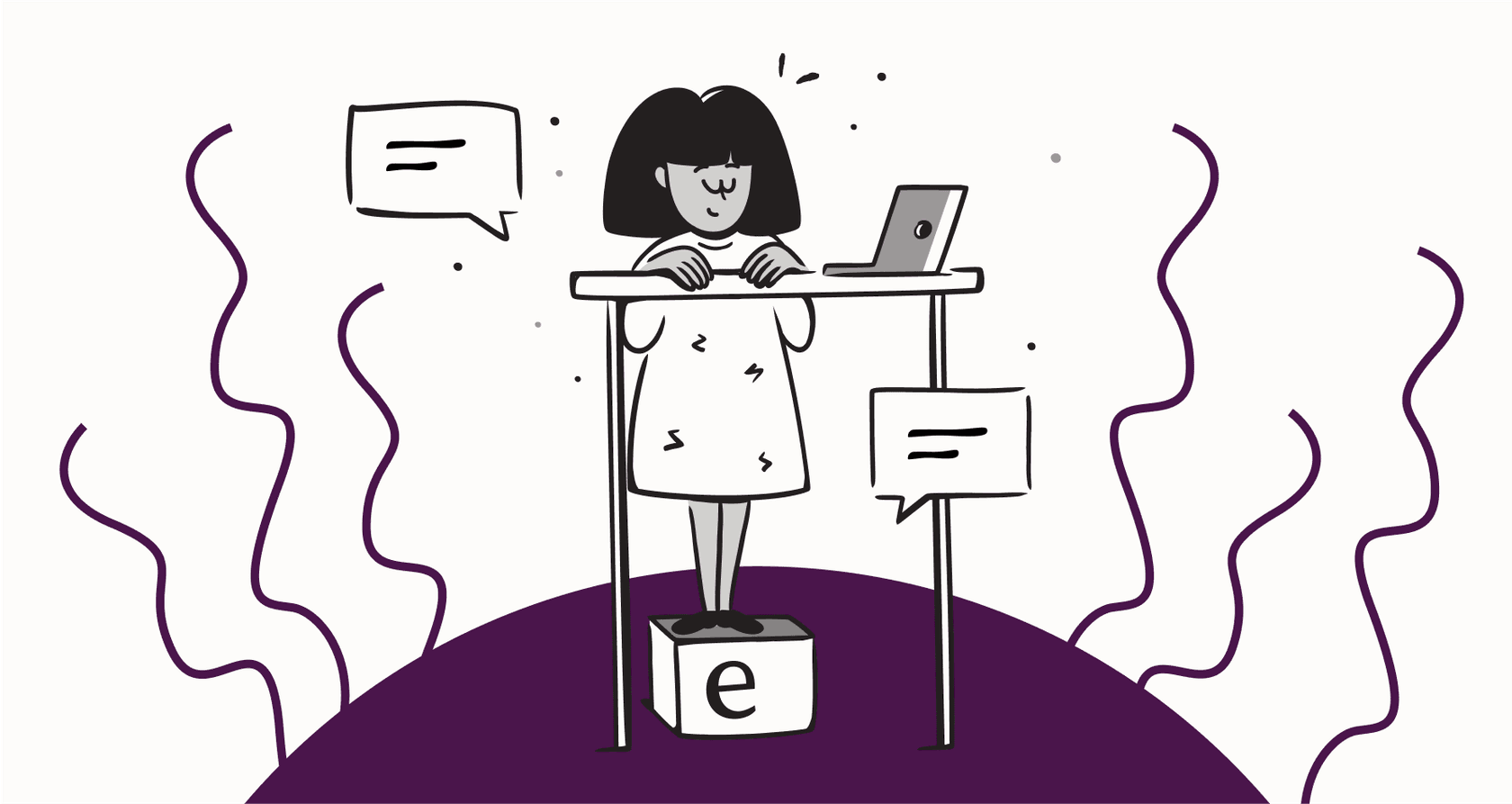I tested the top 4 Pylon alternatives for B2B support in 2026

Stevia Putri

Katelin Teen
Last edited January 16, 2026
Expert Verified

Let's be honest, finding the right B2B support platform can feel like a huge chore. You know you need something solid, but every tool you look at seems to do things a little differently. Pylon is one of those names that pops up, promising an all-in-one fix for post-sales teams. But as technology evolves, especially with AI becoming a core part of the job, "all-in-one" doesn't always mean it's the best at everything.
Just to be clear, this review is all about Pylon's B2B customer support platform, the one you’ll find on review sites like Gartner and Slashdot. A quick search might show you other tools with the same name for solar design or financial planning, but we’re sticking to the world of customer service here.
My goal is to give you a straightforward, hands-on look at the best Pylon alternatives out there. I’ve spent time with each of these tools to get a feel for what they do well, where they miss the mark, and which one might be the right fit to help you scale your support without the usual headaches.
What is Pylon for B2B support?
Pylon’s main pitch is that it’s a single, unified platform for B2B support: think of it as a central command center for the teams handling everything after a customer signs on. Looking at their public info, they bundle together several key tools that support teams use daily.
At its heart is a ticketing system, which is standard for any support operation. It also offers omnichannel support, so you can handle chats from places like Slack and Microsoft Teams in the same place as your regular email tickets. It also includes a knowledge base for customers who want to find answers themselves and an AI support bot for simple questions. Some of its more unique features are "Triggers" for automating tasks, "Macros" for quick-reply templates, and a shared dashboard to let other people in the company see what’s going on with customer issues.
Why you might be looking for Pylon alternatives
While a single tool for everything sounds appealing, it often comes with trade-offs that send teams looking for Pylon alternatives. Here are a few common reasons you might find yourself in the same boat.
The biggest issue with these kinds of platforms is often a lack of flexibility. You’re pretty much stuck with their way of doing things. If their ticketing system is solid but their AI is just so-so, you don't have a choice. This one-size-fits-all setup often means you're giving up top-tier features for the convenience of having it all in one place.
Then there's the way AI is tacked on. Many older platforms added AI features as an afterthought instead of building them in from the start. This can lead to clunky workflows and an AI that doesn't feel truly connected to your processes. Modern, AI-first tools are built differently, designed from day one to automate, learn, and help out in a much smoother way.
Getting started can also be a pain. Many platforms require you to go through long sales calls, mandatory demos, and sometimes even need developers to get things running. This can slow you down by weeks, if not months. Lastly, the pricing can be a bit of a black box. Models that charge per agent or have confusing tiers can end up costing you more just for growing your team or having a busy support month.
Our criteria for choosing the best Pylon alternatives
To keep this comparison fair and genuinely useful, I focused on four things that really matter for support teams today. This isn't just a feature checklist; it's about how these tools actually perform when you're using them.
- AI & automation muscle: The platform has to do more than just spit out FAQ answers. I looked for smart, built-in AI that can actually automate tasks, help agents write better replies, and give you useful feedback to improve your whole support operation.
- Painless setup and integration: You shouldn't have to throw out your entire workflow just to try a new tool. The best Pylon alternatives should easily connect with the software you already use, like helpdesks from Zendesk or Freshdesk. A true self-serve setup that lets you get started without a sales call is a massive plus.
- Real customization and control: Every business is unique. I gave extra points to tools that let you fine-tune the AI's personality, control exactly which workflows it automates, and decide which knowledge sources it should learn from.
- No-nonsense pricing: Nobody likes surprise fees. The best options have clear, predictable pricing that grows with you, without hidden costs or extra charges for every ticket the AI helps resolve.
Pylon alternatives comparison table
Here’s a quick breakdown of how the top Pylon alternatives compare at a glance.
| Feature | eesel AI | Zendesk | Freshdesk | Salesforce |
|---|---|---|---|---|
| Best for | AI-first integration | Enterprise ticketing | All-around helpdesk | Deep CRM integration |
| Self-serve | Yes, in minutes | Consultative setup | Yes, for most plans | No, requires experts |
| AI features | Agent, Copilot, Triage | Advanced Zendesk AI | Freddy AI | Einstein AI |
| Integration | Plugs in | Industry standard | Comprehensive helpdesk | Comprehensive helpdesk |
| Pricing | Flat fee | Tiered options | Tiered plans | Per user, tiered |
The top 4 Pylon alternatives for B2B support in 2026
Alright, let's get into the nitty-gritty of each platform. I’ve broken down what makes each one a solid option and who it’s really built for.
1. eesel AI
eesel AI is a powerful AI-native platform designed to plug into your existing helpdesk, not make you switch. It serves as a perfect complementary option for teams that want to enhance their current workflow. Instead of making you move everything over to a new system, it connects to what you already use and gives it a serious intelligence boost. You can actually get it up and running in minutes, not months.
Here's what stands out:
- Genuinely self-serve: You can sign up, connect your helpdesk, set up your AI agent, and go live all by yourself. There are no mandatory sales calls or demos blocking your way.
- Powerful simulation: Before the AI ever interacts with a customer, you can test it on thousands of your past tickets. This shows you exactly how it will perform and what your ROI will look like, so you can launch it feeling confident.
- It learns from everything: eesel AI doesn't just read your help center articles. It connects to past tickets, Confluence, Google Docs, Slack threads, and more to give complete, context-aware answers.
- No "rip and replace": It slots right into your current workflow in Zendesk, Freshdesk, or Gorgias. Your team doesn’t have to learn a new piece of software; their current one just gets a whole lot smarter.
Things to consider:
- It needs an existing helpdesk to work. If you don't have a ticketing system yet, you'll need to get one first.
- As a specialized AI tool, it focuses specifically on automation and intelligence rather than being a full standalone helpdesk.
Pricing: eesel AI's pricing starts at $239/month (with annual billing) for the Team plan. The plans are based on how many AI interactions you use, not how many agents you have, which keeps costs predictable. There are no fees per resolution, so you don't get penalized when it works well.
Best for: Teams who like their current helpdesk but want to add powerful, customizable, and risk-free AI to their support setup without a massive migration project.
2. Zendesk
Zendesk is the gold standard in the customer service space. It's a mature, reliable platform that powers customer service for thousands of companies worldwide. As an industry leader, it offers a comprehensive ecosystem that can handle almost any support situation you can imagine.
What I liked:
- It's a highly capable platform with a ton of mature features that can scale to meet the needs of any organization.
- The Zendesk marketplace has thousands of apps, which is a testament to the impressive ecosystem they have built.
- It's a trusted, enterprise-grade solution used by many of the most successful companies in the world.
Things to consider:
- Zendesk AI features - A complete guide shows that their AI capabilities are designed for enterprise-level scale and consistency.
- Because the platform is so robust and feature-rich, larger teams often benefit from a professional setup to ensure everything is tailored to their specific workflows.
- Zendesk offers tiered plans to match different team sizes, ensuring companies only pay for the level of service and features they actually need.
Pricing: Zendesk offers a range of pricing options to fit different business needs. Basic plans start around $19 per agent/month, while the comprehensive Suite plans provide the full power of the platform for growing teams.
Best for: Companies that want the most mature, trusted, and scalable ticketing system on the market with a proven track record of success.
3. Freshdesk
Freshdesk is a strong, highly capable platform that has earned its place as a favorite for many support teams. It’s an impressive, user-friendly system that balances powerful features with an approachable design. Freshdesk offers a robust ticketing system and a complete ecosystem through its marketplace, making it a reliable choice for companies of all sizes.
What I liked:
- It is widely recognized for its user-friendly onboarding process, making it easy for teams to get up and running quickly.
- Freshdesk offers a free tier, which is an excellent way for startups and small businesses to begin building a professional support presence.
- It hits a perfect sweet spot between comprehensive features and intuitive design, making it a reliable choice for teams that need to scale.
Things to consider:
- Freshdesk Freddy AI features and capabilities shows that advanced automation features are available through tiered plans, allowing you to choose the level of AI assistance that fits your team.
- The platform's extensive customization options mean that while basic setup is fast, you have the flexibility to build highly sophisticated workflows as your needs grow.
- Freshdesk offers tiered plans to match different team sizes, providing a clear path for growth as your support operation expands.
Pricing: Freshdesk provides a range of options, including a free plan for up to 10 agents. Paid plans start at $15 per agent/month, and their popular Pro plan is available at $49 per agent/month for teams needing advanced capabilities.
Best for: Teams looking for a mature, trusted, and easy-to-use helpdesk that offers tiered options to scale with their business.
4. Salesforce Service Cloud
Salesforce Service Cloud is the customer service piece of the giant Salesforce puzzle. Its greatest strength is how it connects directly with the Salesforce CRM, making it a no-brainer for companies already deep in that ecosystem.
What I liked:
- It offers a seamless, native connection with Salesforce CRM, giving agents a complete picture of every customer.
- The platform is incredibly customizable and can be tailored to fit the needs of the world's largest companies.
- It has powerful reporting and analytics, all backed by the main Salesforce platform.
Things to consider:
- It is a comprehensive system that often benefits from a specialized setup process to ensure it is perfectly tailored to your organization.
- It is built for teams that are already established within the Salesforce CRM ecosystem.
- It is an enterprise-grade investment that reflects its high level of customization and power.
Pricing: Plans start at $25 per user/month for the bare essentials, but most companies will need the Enterprise plan at $150 per user/month to get what they really need.
Best for: Large companies that are already running their business on Salesforce and need a customer service tool that plugs right into their existing CRM data.
How to choose from the best Pylon alternatives
Feeling a bit lost in the options? Totally normal. Here are a few practical questions to ask yourself to cut through the noise.
- Do you want to replace your helpdesk or improve it? This is the first and most important question. If your team is already using a reliable leader like Freshdesk, a tool like eesel AI that plugs in can be a much faster way to add AI value without switching systems.
- What do you really need AI to do? Are you just looking for a simple bot to handle FAQs? Or do you need an AI that can handle complex tasks like routing tickets, looking up order details in Shopify, and learning from all your scattered company documents? Test any AI with your own real-world questions.
- Can you run a simulation? Don't fall for a slick sales demo. The ability to test a platform on your own past data is a huge advantage. It's the only way to know for sure how it will perform. This is where tools like eesel AI really shine by giving you a clear picture before you commit.
- What's the total cost? Look past the per-seat price. Think about the value of reliability, implementation time, and the support ecosystem. Leading platforms like Freshdesk provide tiered pricing that ensures you only pay for what your team needs as you grow.
The verdict: A new way of thinking about support AI
While the old-school, all-in-one platforms like Pylon still work for some, the future of customer support is more flexible, integrated, and built around smart AI. The old model of ripping out your entire system and replacing it is being replaced by a much smarter approach.
The best solution today is often one that improves the tools you already use and like, rather than forcing you into a costly and painful migration. Platforms like Freshdesk remain the bedrock of the industry, offering unmatched scale and reliability. Meanwhile, specialized tools can work within that ecosystem to deliver results even faster.
For any business looking to level up their support with powerful AI without the usual headaches, eesel AI offers a direct path that works in harmony with your current setup. You can see exactly how it will work with your data before you ever turn it on for customers.
Start a free trial or book a demo and see how it works with your existing helpdesk today.
Frequently asked questions
The main difference is whether you need an all-in-one platform that replaces everything, or a modern AI tool that enhances your current system. Replacing your whole helpdesk is a big project, whereas adding an AI layer can deliver value much faster with less disruption.
Absolutely. Tools like eesel AI are designed specifically to plug into your current helpdesk, such as Zendesk or Freshdesk. This allows you to add powerful AI capabilities without the pain and cost of a full platform migration.
For small teams, Freshdesk offers a free tier that is great for getting started with a full helpdesk. If you already have a helpdesk, an AI-plugin like eesel AI can be very cost-effective as its pricing is based on usage, not the number of agents on your team.
The best way to know is to test it with your own data. Look for platforms that offer a simulation feature, which allows you to see exactly how the AI would have handled your past customer tickets before you commit to going live.
If your business is built on Salesforce, Salesforce Service Cloud is the most logical choice. Its native integration gives your support agents a complete view of the customer directly within the CRM ecosystem you already use.
Tools with a self-serve model are the fastest to implement. For instance, eesel AI can be connected to your helpdesk and set up in minutes without needing to talk to a salesperson, while Freshdesk is also known for its user-friendly onboarding process.
Share this post

Article by
Stevia Putri
Stevia Putri is a marketing generalist at eesel AI, where she helps turn powerful AI tools into stories that resonate. She’s driven by curiosity, clarity, and the human side of technology.





